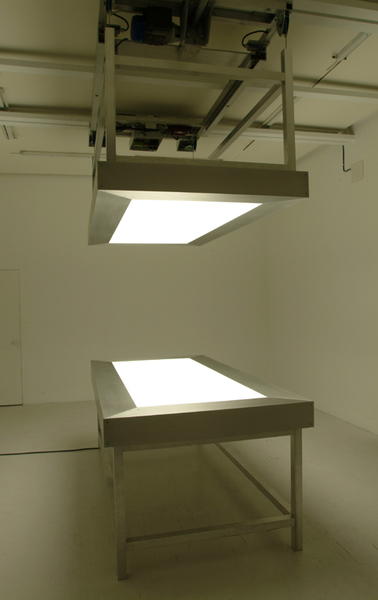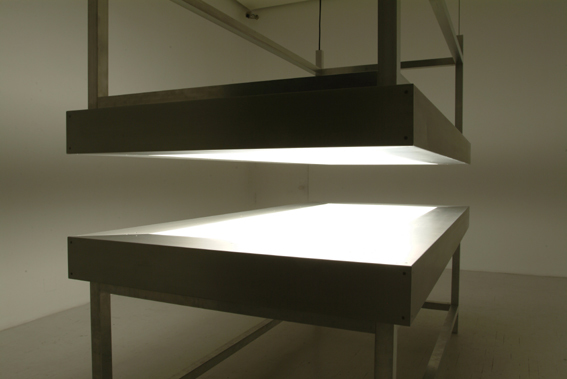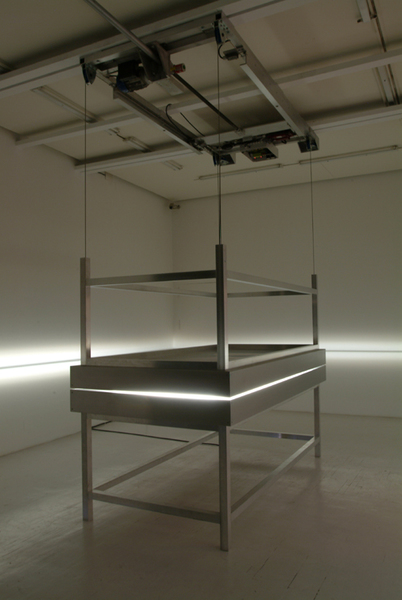
El lamento de las imágenes, 2002. 2 light tables with movement mechanism. 92 x 245 x 122 each table. Edition of 10 + exhibition copy. |

El lamento de las imágenes, 2002. 2 light tables with movement mechanism. 92 x 245 x 122 each table. Edition of 10 + exhibition copy. |

El lamento de las imágenes, 2002. 2 light tables with movement mechanism. 92 x 245 x 122 each table. Edition of 10 + exhibition copy. |
Lament of the images is a philosophical essay on today’s crisis of representation.
Lament of the images is a poetic meditation on what is seen and what is not.
Lament of the images is a search for light in the darkness.
Lament of the images is about our increasing blindness.
Lament of the images is a lament of the images.
Alfredo Jaar, January 2002
----------
Lament of the images
A light table is a photographer's working space, where he views, analyzes and selects his images before offering them to the world. It is a neutral, meditative background for images to become alive again.
In the second version of Lament of the images, the artist collapses two identical light tables, one on top of the other, in an unlikely embrace of light.
The space remains dark, only a misterious ray of light emanates from the space between the two tables, casting a single line of light on the space's walls.
Every 6 minutes, the top table raises slowly, revealing total emptiness of images. Only light emanates from both tables, illuminating the space and the audience.
In the absence of images, the light illuminates the real world, the spectators, the origin of all images.
This piece suggests a return to the source of all images, away from the fakeness and manipulation of most photographic representation.
Let there be light.
----------
Since Alfredo Jaar first came to international attention in the 1986 Venice Aperto, he has consistently explored issues of displacement, the imbalance of power between industrialized and developing nations and the effects of military conflict on human life. He has traveled to Latin America, Asia and Africa to investigate issues as diverse as the effects of toxic waste on a village in Africa, the plight of the gold miners in Serra Pelada, Brazil, the conditions of Vietnamese refugees incarcerated in Hong Kong, and most recently, the genocide in Rwanda. Since his stay in Rwanda in 1994 he has made a number of works related to the genocide and the immense movement of refugees globally. Most recently, he has concentrated his hybrid art form of sculpture, installation and text on the power of images to shape or alter consciousness.
Jaar's work transforms the raw experience of politics into poetry and spiritualism. The installation at Lelong, first shown and commissioned by Documenta 11 in Summer 2002, led the viewer through darkness to light. Three illuminated texts discussed the commodification and the destruction of history. As a finale, the blinding white light read as both transcendence and obliteration. Conceived anew for the interior of the gallery's space, the installation is complemented by a new sculpture installation, a kinetic light table.
Lament of the Images is a summation of Jaar's issues and concerns, raising questions about the legacy of colonialism and the conflicts which exist in our globally connected world. The damage resulting from the overload of images are explored in this exhibition by the erasure of the image, leaving us with a sense of abandonment and disillusionment. To lament is to mourn, and a feeling of elegy permeates the exhibition. The texts, drawn by the artist from news sources and composed by David Levi-Strauss, move us to question how history and culture are shaped and constructed, often by omission. Alfredo Jaar's Lament of the Images brings us to a state where the boundaries between image and power are realigned.
Lament of the Images will continue through Saturday, November 30, 2002. The gallery will be closed on Thanksgiving Day, Thursday, November 28th. Gallery hours are 10 to 6, Tuesday through Saturday. For more information and images, call Mark Hughes at (212) 315-0470.

